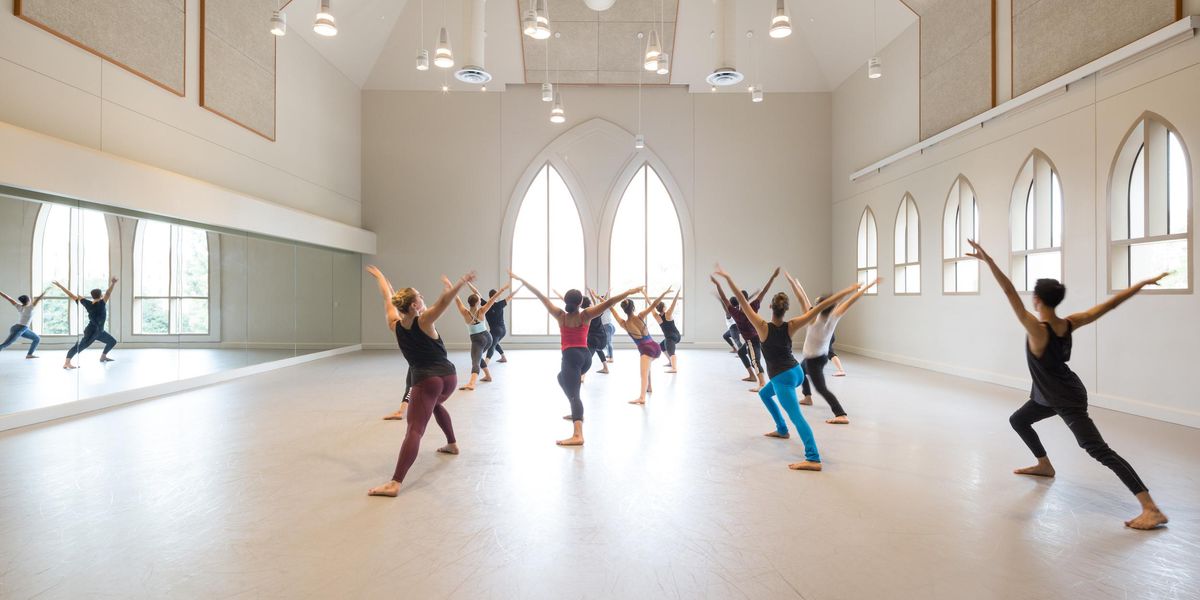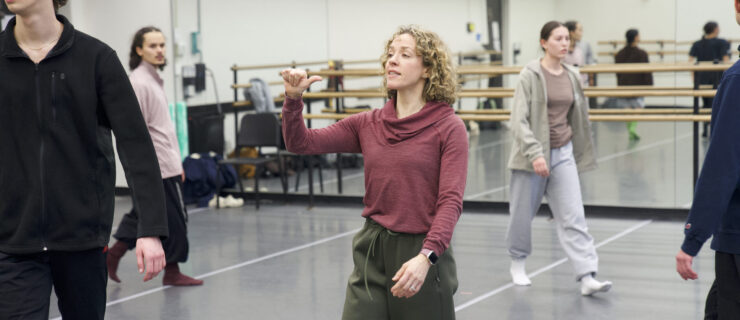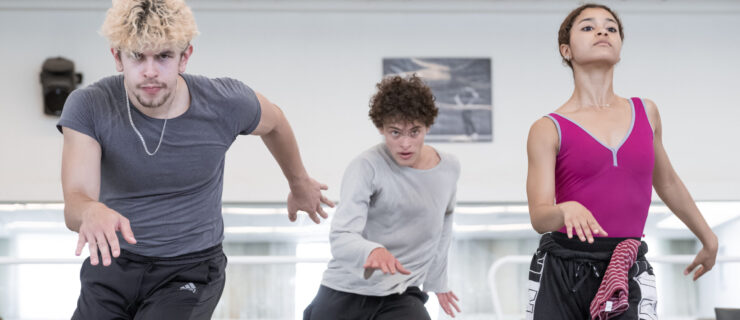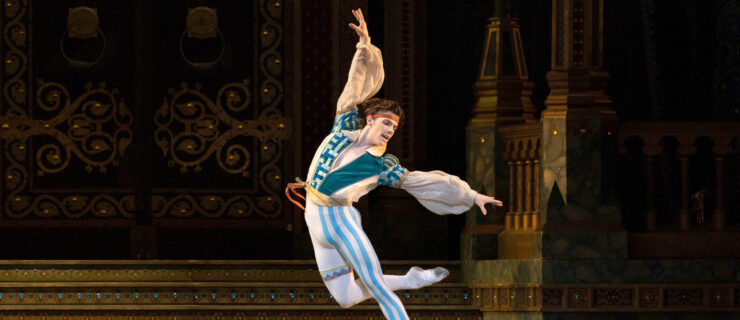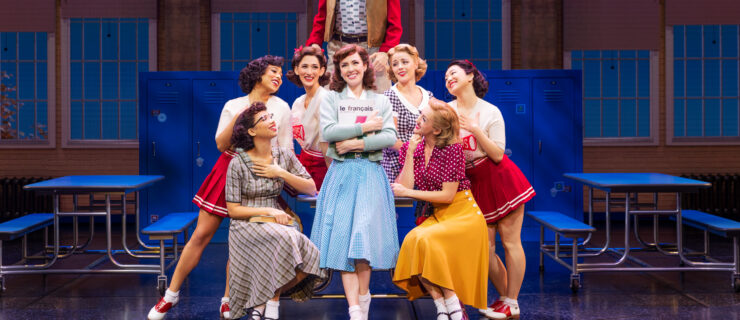Will Allison and Rex Get Together? – and Other Burning Issues
Breaking Pointe.
Allison DeBona and Rex Tilton of Ballet West and
Breaking Pointe. Photo by Matthew Karas.
Will there be more dancing? Will Allison and Rex be officially dating? Will Beckanne, the ingénue of the company, keep getting cast in top roles? Will Adam have to deliver more bad news regarding contracts?
Whatever the questions about Season 2 of TV docudrama Breaking Pointe, one thing is clear: The ratings were high enough—including a deluge of social media—that the producing company, BBC Worldwide Productions, and the family network CW decided to go for a second season, which begins July 22.
Season 1 brought the dancers of Ballet West into a million homes last year. Some viewers had probably never seen ballet up close before, while others were dancers and diehard fans. The Ballet West Academy saw a huge jump in the number of students auditioning for its summer intensive, and tourists to Salt Lake City have made Ballet West a destination.
But how did the 10-week intrusion of cameras, mikes, and tech crews affect the company?
Artistic director Adam Sklute believes it had a positive effect. “The intensity of the filming process has actually brought us together.” But for some of the dancers, the benefits were more complex.
“Last year was a hard pill to swallow,” says Allison DeBona, who came off as being a bit obsessive and a complainer. The cold shoulder she turned to Rex Tilton became the recurring soap-opera theme of Season 1. Because the dancers don’t see how the scenes are edited until they air, DeBona says, “I was shocked that they wanted that story between Rex and me to be highlighted.” She was caught off guard by the negative attention she attracted on social media. “They called me a diva and other names. People think I’m a horrible narcissist—I got that direct feedback to my Facebook page.”
At right: Photo of DeBona by Matthew Karas.
Viewers may not realize the pressured situation the dancers find themselves in. “It is really hard to have the cameras around all the time,” says Chris Ruud, the principal dancer who is also the director of Ballet West II. “We all know way too much about each other already. We spend all day every day in the same room, and between the mirrors and the one-way window to the hallway, we are perpetually in a fishbowl. So when the cameras are in the studio, before you even speak to a friend—first you ask, ‘Are you wearing a microphone?’ ”
In fact the dancers came up with a code word, “ravioli,” that they would say to warn their pals they were miked. Even so, Beckanne Sisk (“On the Rise,” July 2012), found that being “followed” could put a dent in friendships. “I have a couple of close friends who are not into the whole Breaking Pointe thing,” says Sisk. “During the filming process they’re never really around. In class I’m miked, so they don’t want to come up and have a conversation. It kinda sucks. It sort of pushes people away.”
Sisk, however, jumped in with both feet this season. She admits that “the first season was so much fun that when [the production crew] left, it felt like it was just so boring.” This time around Sisk, whose appearance on Season 1 attracted tens of thousands of fans on social media, decided to allow the crew to come into her home. “In the first season I didn’t want to say anything they could take the wrong way. So I thought maybe the second season I could open up a little and let people see the real me.” She now says she’s “a little nervous” about revealing too much about her personal life.
Above: Photo of Sisk by Erik Ostling, Courtesy The CW.
Ruud had his own reasons for getting involved in Season 2. “Carrying on the legacy of my family and the history of the company is important to me,” says Ruud, whose father Tomm had danced with the company for 10 years. “But I have to admit I really think the BBC producers have demonstrated a commitment to show the dance—the work and the sweat behind what we do.”
That commitment is the direct result of Breaking Pointe executive producer Izzie Pick Ashcroft’s genuine interest in dance. As a young college grad, she took a temp job that allowed her to observe The Royal Ballet dancers close up. Later she was part of the team that introduced Dancing With the Stars to the U.S. “I’m fascinated by people who do extraordinary things with their lives,” she says. “Dancers endure a lot for the love of what they do.” When asked if anything about their lives surprised her during Season 1, she says, “I probably underestimated the fragility of their careers. If they didn’t get a contract, it rips relationships apart. It’s just tragic when they have to leave.” Case in point were the poignant scenes when Katie (Kathleen Martin), a BW dancer dating Rex’s brother Ronald in the company, was not asked back. She had to find another city to dance in. (She is now with Ballet Idaho.)
Explaining why he agreed to participate in both seasons, Rex says, “We want to be at a personal level with our audience. If they come to a performance to see someone they feel they know, it will add dimension to their experience. Letting people know what we go through to get to this level of artistry would ultimately be better for the art.”
Above: Christiana Bennett and Rex Tilton in rehearsal. Photo by Erik Ostling, Courtesy The CW.
Of course, some dancers have chosen to keep their art onstage and not onscreen. Arolyn Williams (“On the Rise,” July 2010), first-cast as Cinderella in Ashton’s celebrated version, chose to limit her participation in Season 2. “There was so much to learn,” she says. “I had to focus so hard that I didn’t have time to worry about cameras or mikes.”
One point all agree on is that last season the docudrama was heavier on drama than on documentary. This year, Ruud observed, “They pushed less for the personal drama moments and were more interested in us as dancers.” However, the dancers have absolutely no control over how the narrative is shaped—and Ashcroft isn’t giving anything away.
Ruud feels that it is not the manufactured controversies but “the real moments of conflict between people that makes the show interesting.” For example, in an upcoming episode artistic director Adam Sklute chooses not to cast corps dancer Joshua Whitehead in a comic role in Cinderella that Whitehead thinks he’s right for. Whitehead is the only African- American male dancer in the company, and as the episode climaxes he confronts Sklute, asking, “Is it because I’m black?”
Above: Adam Sklute conferring with Christopher Ruud. Photo by Erik Ostling, Courtesy The CW.
“That was an honestly emotional moment,” Sklute recalls. “I am either going to get flack or praise for this decision—probably a little of both.”
The scenes in restaurants, bars, and beauty parlors tend to be the “manufactured” ones, or what could be called “heightened reality.” When asked about the scene from Season 1 in which his wife, principal ballerina Christiana Bennett, cries during a vulnerable moment in a restaurant, Ruud shakes his head as if trying to remove the memory. “They push and push for those things,” he says. And then, with some sense of relief, he notes, “Mostly they showed her exactly how she is: gorgeous and professional and wonderful.”
An unexpected side benefit of seeing your “life splattered all over the screen,” admits DeBona, is the opportunity for self-reflection. “It forces you to look at yourself and say, ‘The way I acted in this situation obviously didn’t come off the way I thought it would.’ It is sort of like therapy. I feel like I’ve grown so much because of this show.”
Being in Mountain Standard Time created an interesting gap for DeBona. “My family lives on the East Coast, so they would watch it first and call me on Skype. My brothers would scream during a scene and say things like, ‘Oh my God sis, you’re gonna die, you can’t believe this,’ and I would have to wait two hours to watch it.”
If there is a guiding principal to the editing, Ashcroft says it’s something she’s learned from other reality shows: “You have to understand people’s struggles to understand their triumphs.” She is committed to showing the hard work that goes into ballet. At the same time she is aware of the position it puts the dancers in. “Adam took a risk with us,” she says.
For his part, Sklute says, “I’m not sure another group of dancers would have agreed to do this or been able to survive it. But this is a particularly congenial group, which is why I think they could weather the storm.”
Kathy Adams writes on dance for the
Salt Lake Tribune. Wendy Perron is DM editor in chief.
What got edited out?
Rex: Regarding the scene where Allison had a fit about the conductor’s inconsistent tempos: “That wasn’t Allison’s fault. All of us were having issues with tempos and they just made her the fall guy.”
Adam: “They filmed me saying that dancers were expendable. What they cut out was that I also said we are all expendable, that I am expendable too, and we all need to realize that.”
Rex again: “We are actually a pretty relaxed company. Our daily routine can sometimes be really fun and goofy, and most of that was left out.”
At left: Photo of Tilton by Matthew Karas.
